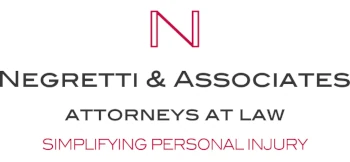How to Prove You Are Not at Fault in a Car Accident
Let’s say you’ve been in a car accident and it’s not your fault. To you, it’s obvious that you didn’t cause the accident. Yet, to the contrary, the other party in the accident won’t accept fault. What do you do?
If you need a “crash course” on how to prove you are not at fault in a car accident, Negretti & Associates Attorneys at Law will be happy to be your guide. Licensed in Arizona, California, and Colorado, our attorneys can lead you every step of the way, by collecting evidence, interviewing witnesses, and hiring experts who can demonstrate that the other driver was at fault.
The process of proving you’re not at fault in a car accident starts with collecting evidence. The best thing you can do to prove that you’re not at fault is to have independent evidence supporting your version of the incident. This can come in the form of things like photographs, third-party witnesses, police reports, surveillance videos, body cam footage, and 911 audio.
It is possible that the opposing party will do the right thing and admit fault. But don’t count on that, especially once insurance companies get involved!
How Fault Is Determined in Car Accidents
In the context of personal injury claims, fault is really something that is determined by a judge or jury. A party may accept responsibility for an accident in an attempt to resolve a claim. However, it is a misconception to think that anyone other than a judge and jury can determine fault.
The police who investigate an accident do not determine fault. Your insurance company does not determine fault. The other party’s insurance company does not determine fault. A witness alone cannot determine fault. Any of the above may factor into determining fault in a specific case, but none are solely responsible for adjudicating fault.
In a more general sense, fault can be determined by relying on the laws where the accident occurred and by looking at the particular facts of circumstances of the accident itself.
For example, in Arizona, one law — ARS 28-772 — states that a vehicle turning left must yield the right-of-way to oncoming traffic. However, there are plenty of scenarios where the presumed “right-of-way” vehicle runs a red light and hits the left-turning vehicle. Although the law presumes that the left turning vehicle is at fault, the particular facts and circumstances of that incident would be helpful in reaching a final determination of fault.
For this reason, it’s important to consult with an attorney to go over the facts of your accident, to achieve a better understanding of who might be at fault.
Disputing a Determination of Car Accident Fault
In order to properly dispute fault in a car accident, you have to gather evidence that will help a judge or jury understand and accept your story. Your testimony will typically not be enough to dispute fault.
Although you will always be your own best advocate, it’s important to have a legal team on your side. A law firm can help you gather the necessary evidence and guide you through the process, because of their experience in dealing with disputed fault cases.
Can You Dispute a Police Report?
This may not surprise you, but police reports can be wrong. Police officers are human beings and are capable of making mistakes just like everyone else. The question is whether the mistake is fatal or not. In other words, what does the mistake mean to your case?
If the mistake is the color of your vehicle, that probably doesn’t mean a whole lot to your case. However, if you are quoted saying something that you didn’t say, that may be more important to your case.
At the end of the day, generally speaking, police reports are not admissible as evidence in car accident cases. Certain parts of the police report may be admissible, whereas others are wholly inadmissible. If you believe that a mistake in a police report is something you need to worry about, consult with an attorney.
How Do You Fight an Insurance Claim Made Against You?
If you have automobile insurance at the time of your accident, your own insurance company has a duty to defend you against claims being made against you. This is not to say that your insurance company is truly looking out for your best interests. It simply means that they will handle the claim being made against you and hire and pay for a lawyer on your behalf, if needed.
The important thing to understand is that these claims adjusters and lawyers work for the insurance company. They do not care about you and will not “fight” to protect you.
If you need help with solving the riddle of how to prove you are not at fault in a car accident, reach out to Negretti & Associates today. Call us at 602-531-3911 in Arizona, 619-777-3370 in California, or 720-636-3444 in Colorado. Or, you can contact us online, or send us a text.



